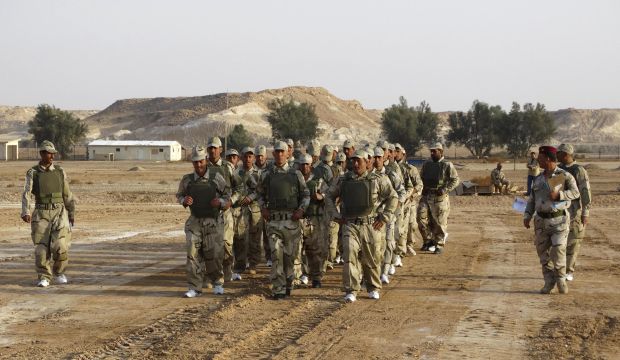
Tribal fighters take part in military training to prepare for fighting against Islamic state of Iraq and Syria (ISIS) militants, at the Ain Al-Assad military base in Iraq’s Anbar province, on November 15, 2014. (Reuters)
Baghdad and Erbil, Asharq Al-Awsat—The heads of two prominent Sunni Anbar tribes expressed unease about the prospect of cooperating with the US against the Islamic State of Iraq and Syria (ISIS) on Wednesday, and repeated calls for the Iraqi government to support them with funds, weapons, and ammunition.
The leaders of the most important Sunni tribes in the province, Sheikh Naim Al-Kaoud, head of the Albunimr tribe, and Sheikh Rafi Abdul Karim Al-Fahdawi, head of the Albufahd tribe, both told Asharq Al-Awsat they were wary of any US involvement in the fight against the extremist group in Anbar.
“For us . . . it would be better for the Iraqi state to arm us,” Kaoud said. “If, for whatever reason, it is not able to do this, I want to use this opportunity to call on the Arab countries, especially . . . Saudi Arabia, the UAE, and also Jordan to help arm us before the US does.”
Fahdawi also expressed similar sentiments regarding cooperating with the US.
“The question of arming the [Sunni Anbar] tribes is a very important one,” he said. “But what we truly fear is that all this racing towards America [by the Iraqi government] is the result of other interests that will harm those of the Anbar tribes and their families, who have paid a heavy price these recent years.”
Both also added they were still in need of the support that they said had been promised to them by the government of Prime Minister Haider Al-Abadi, and which they say they have yet to receive.
Kaoud, whose tribe has lost around 650 members to ISIS, said the Iraqi government had not been “serious” in responding to the tribes’ requests for arms, despite their earlier promises and their being “totally capable” of doing so.
Despite this, he said, volunteer fighters from his tribe were in “high spirits” and keen to fight against ISIS, though they lacked the necessary funds, weapons, and ammunition to pose a serious threat to the group.
As a result, “our tribe has had to resort to purchasing weapons [ourselves] because the conflict between us and ISIS has become one of revenge,” he said.
In retaliation for the Albunimr tribe’s defiance, ISIS has reportedly killed several hundred members of the tribe in a series of massacres, in a bid to stifle further resistance and as a warning to others.
Saad Al-Hadithi, a spokesman from Abadi’s office, told Asharq Al-Awsat the prime minister was “eager” to arm the tribes and viewed this process as a “necessary one,” but that the “specific mechanisms of achieving this still need to fine-tuned.”
“Previously, there were weapons and funds which were offered to the tribes [in Anbar], but they ended up being misplaced,” he added.
Dalshad Abdullah contributed additional reporting from Erbil.

Trackbacks/Pingbacks